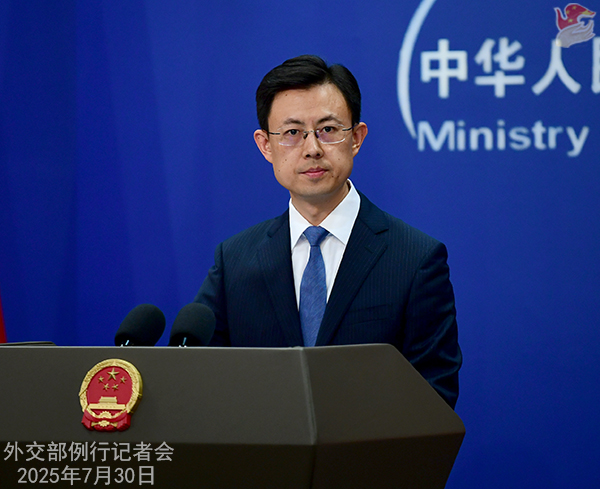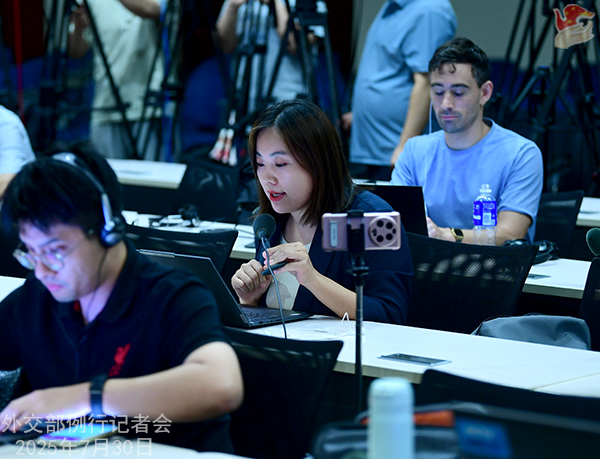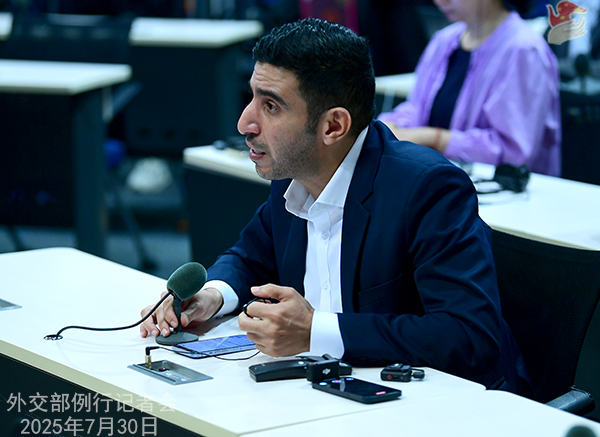
People’s Republic of China


China News Service: We’ve learned that today, the informal consultation among China, Cambodia and Thailand was held in Shanghai. Could you share more details? What has China done to promote talks for peace since the outbreak of the conflict between Cambodia and Thailand?
Guo Jiakun: Since the outbreak of the conflict along the border between Cambodia and Thailand, as their friendly neighbor, China has actively worked for deescalation in its own way. Foreign Minister Wang Yi met with his Cambodian and Thai counterparts and ASEAN Secretary-General. The Chinese Foreign Ministry has maintained close communication with the two countries and passed on messages between them multiple times in light of the developments. The MFA’s Special Envoy for Asian Affairs made two shuttle-diplomacy trips to promote talks for peace between the two sides. China supports ASEAN in playing its role, and has kept in close contact with Malaysia, ASEAN’s rotating chair, and sent its representative to the special leaders’ meeting in Kuala Lumpur.
In light of the fragile momentum of the ceasefire, on the morning of July 30, Vice Foreign Minister Sun Weidong had an informal consultation in Shanghai with representatives of Cambodia and Thailand. The two countries reaffirmed to China their commitment to upholding the ceasefire and appreciated the positive role played by China in restoring peace and calm. The meeting proceeded in a candid, friendly and conducive atmosphere. It is China’s latest diplomatic effort to facilitate the implementation of the ceasefire and create conditions for quickly restoring peace and stability along the Cambodia-Thailand border.
China practices the Global Security Initiative, promotes the building of a model of security for Asia featuring common security, seeking common ground while shelving differences, and dialogue and consultation, and stays committed to keeping the region peaceful and stable. China does not seek any selfish gains on the matter, and supports ASEAN in facilitating a political settlement of the situation between Cambodia and Thailand through the ASEAN way. We stand ready to continue to maintain close communication with regional countries, namely Cambodia, Thailand, and Malaysia, to play a constructive role for cementing the ceasefire and restoring peace and stability at an early date.
Hubei Media Group: The humanitarian situation in Gaza has been highly concerning in the international community. French President Emmanuel Macron and UK Prime Minister Keir Starmer expressed the possibility of recognizing a Palestinian state in the UN General Assembly. Meanwhile, it’s reported that the Israeli Security Cabinet still considers a full military occupation of the Gaza Strip, and a siege on cities where Hamas is active. What’s China’s comment on the current situation in Gaza?
Guo Jiakun: China closely follows the current situation in Gaza, and opposes Israel escalating military operations in the region. We’re deeply concerned over the humanitarian disaster of the people in Gaza. It has been 21 months since the latest conflict broke out, and the humanitarian situation in Gaza has never been so severe. The World Health Organization said in a recent statement that among 74 malnutrition-related deaths in Gaza this year, there have been 63 this month, including 25 children. This is the latest evidence of the humanitarian disaster in Gaza. We call on relevant parties, especially Israel, to immediately stop military operations in Gaza, lift the blockade and siege on Gaza, fully resume the access of humanitarian supplies, and prevent a humanitarian crisis on a larger scale.
The Palestinian question is at the heart of the Middle East issue. The two-State solution is the only way out of the Palestinian question. China firmly supports the Palestinian people in establishing the independent State of Palestine. We stand ready to continue to work with the international community to end the fighting in Gaza as soon as possible, ease the humanitarian crisis, implement the two-State solution, and ultimately realize the comprehensive, just and lasting settlement of the Palestinian question.

Beijing Youth Daily: The issue of Japan’s abandoned chemical weapons (ACWs) in China is a major issue between China and Japan left over from history. Today marks the 26th anniversary of the signing of the MOU between the governments of the People’s Republic of China and Japan on the destruction of the chemical weapons abandoned by Japan in China. Can you update us on how the work is progressing and whether China has any concerns or requirements?
Guo Jiakun: Japan’s abandoned chemical weapons (ACWs) in China mark one of the gravest crimes that Japanese militarists committed during the war of aggression against China. China has been urging Japan to destroy them completely and thoroughly at an early date in strict accordance with the Chemical Weapons Convention and the MOU between the two countries’ governments. To date, Japan has excavated and retrieved over 160,000 ACWs and destroyed 130,000 or so. However, the destruction process is generally seriously lagging behind schedule.
This year marks the 80th anniversary of the victory of the Chinese People’s War of Resistance Against Japanese Aggression and the World Anti-Fascist War. Today marks the 26th anniversary of the signing of the MOU between the governments of China and Japan on the destruction of the chemical weapons abandoned by Japan in China. Even today, the ACWs still pose a serious threat to the safety of the life and property of the Chinese people and the ecological environment. Japan has unshirkable responsibility on historical issues. China urges Japan to take seriously the concerns of China and the international community, deeply reflect on its history of aggression, honor its commitment, increase inputs in all respects, do everything possible to speed up the full chain of the disposal of the ACWs, so that the day will come sooner when the Chinese people no longer have to live on soil tainted by ACWs, and when justice is restored to the international community.
Xinhua News Service: It’s reported that owing to the U.S.’s refusal of the stopover in New York, Lai Ching-te put off his plan to visit the so-called “diplomatic allies” in Latin America. What’s your comment?
Guo Jiakun: Let me stress again that the one-China principle is a basic norm in international relations and a prevailing international consensus. The commitment to the one-China principle is where the arc of history bends and public opinion trends, and the right thing to do. The Lai Ching-te authorities’ separatist provocations will lead nowhere, still less shake the solid and strong international commitment to the one-China principle or stop the overriding historical trend towards China’s reunification.
We also hope Taiwan’s so-called “diplomatic allies” will not be repeatedly swayed or used by “Taiwan independence” forces. Instead, they should get a clear sense of where things are headed, change their course, and make the right decision that meets the historical trend and serves people’s long-term interests as early as possible.

Asharq News: The International Conference on the Peaceful Settlement of the Question of Palestine and the Implementation of the Two-State Solution, hosted by New York under the joint chairmanship of Saudi Arabia and France, issued the final statement “New York Declaration.” What’s China’s comment?
Guo Jiakun: China supports the UN high-level international conference on the two-State solution and commends Saudi Arabia and France for their efforts. The meeting further builds international consensus on the Palestinian question and sends a strong message calling for the political settlement with the two-State solution, which is welcomed by China. Zhai Jun, China’s Special Envoy for the Middle East issue, attended and addressed the meeting. He called for reaching a full ceasefire with maximum urgency and deescalating the humanitarian situation; upholding the principle of “Palestinians governing Palestine” to advance governance in both the Gaza Strip and the West Bank; supporting Palestinian internal unity and assisting Palestine with its capacity-building in governance and improvement of economic resilience; safeguarding the momentum of peace for implementing the two-State solution; adopting a shared, comprehensive, cooperative, and sustainable approach to security to achieve lasting peace in the Middle East.
China is of the view that the Palestinian question is at the heart of the Middle East issue. The two-State solution is the only way out of the Palestinian question. We stand ready to continue to work with the international community to end the fighting in Gaza, ease the humanitarian crisis, implement the two-State solution, and ultimately realize the comprehensive, just and lasting settlement of the Palestinian question.
Bloomberg: After the trade talks in Stockholm, the U.S. and China released readouts. The Chinese side said that they had agreed to extend the tariff truce without providing any more details. Can you provide more details on what China agreed to at that meeting?
Guo Jiakun: China released readouts on the trade talks. We hope the U.S. will work with China to follow the important common understandings reached by the two presidents during the phone call, make good use of the consultation mechanism, have more consensus and cooperation and fewer misperceptions through dialogue and communication on the basis of equality, respect and mutual benefit, achieve more mutually beneficial results, and jointly promote the sound, steady and sustainable development of bilateral relations.
AFP: U.S. Treasury Secretary warned that if China continues to buy Russian oil, China may face higher tariffs. What’s China’s comment?
Guo Jiakun: China will take energy supply measures that are right for China based on our national interests. Tariff wars have no winners. Coercion and pressuring cannot solve problems. China will firmly safeguard its own sovereignty, security and development interests.



